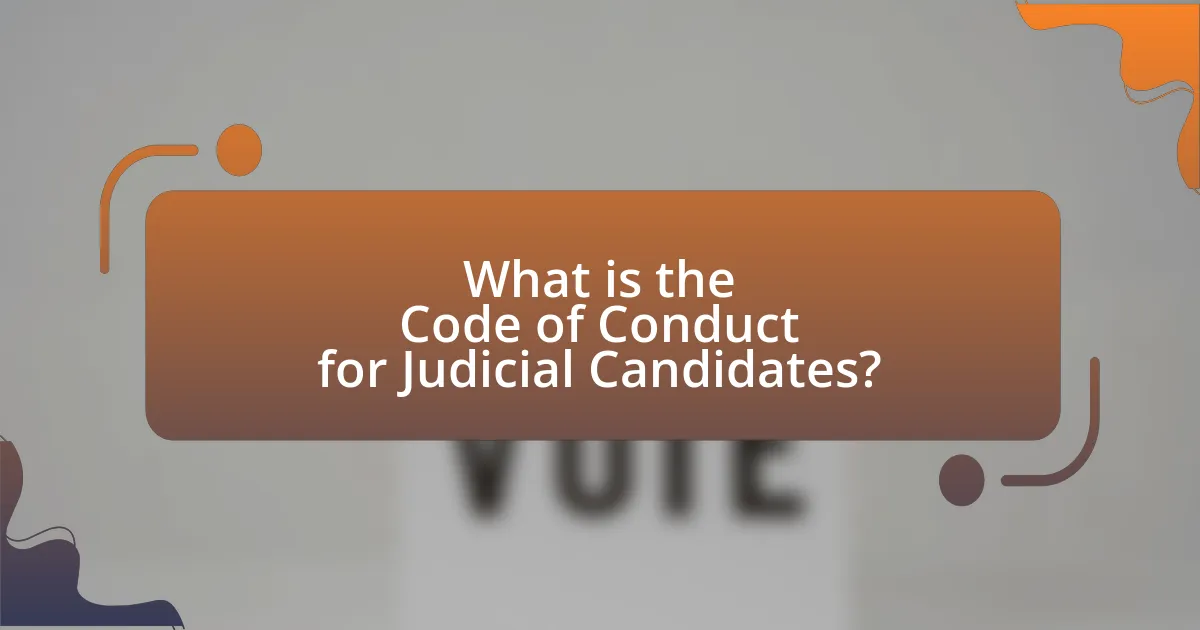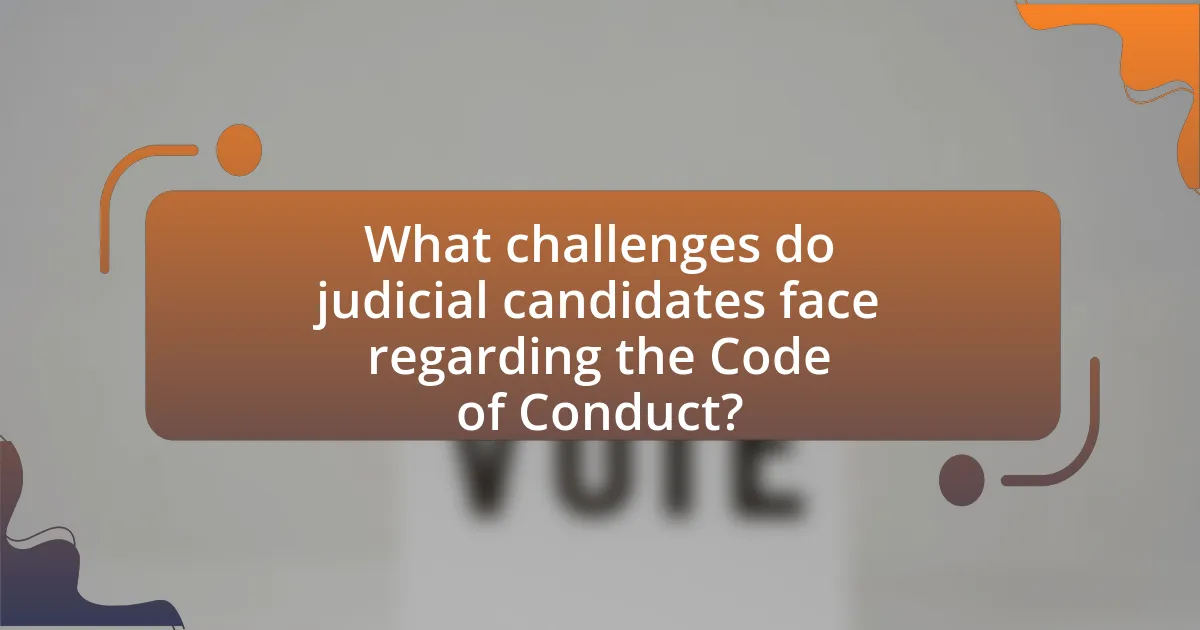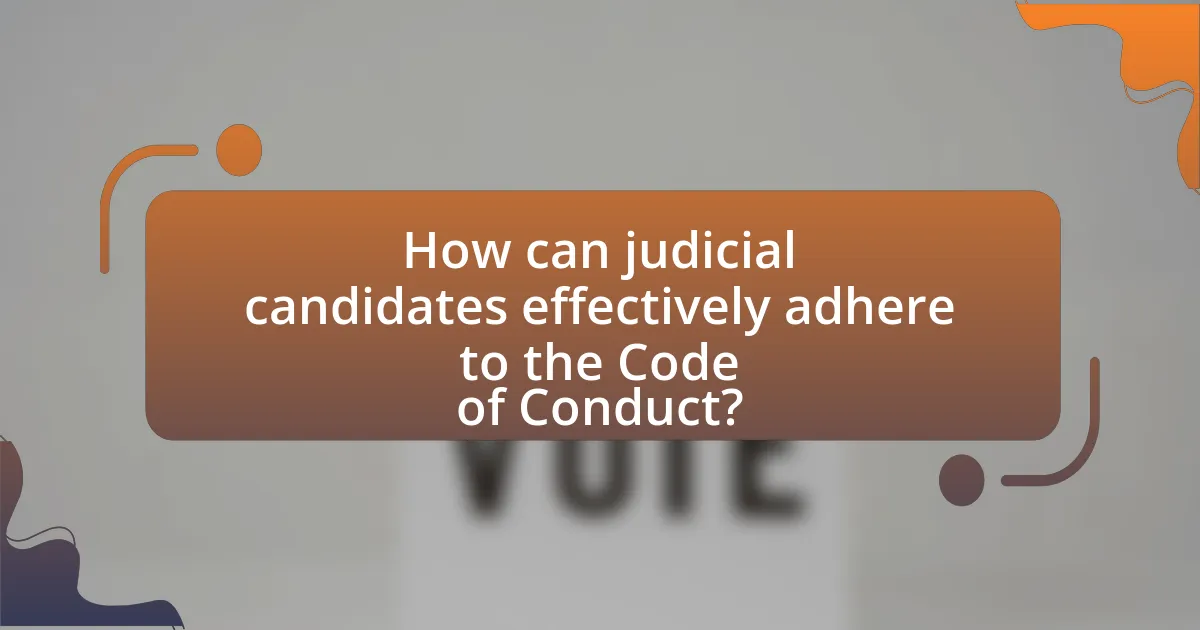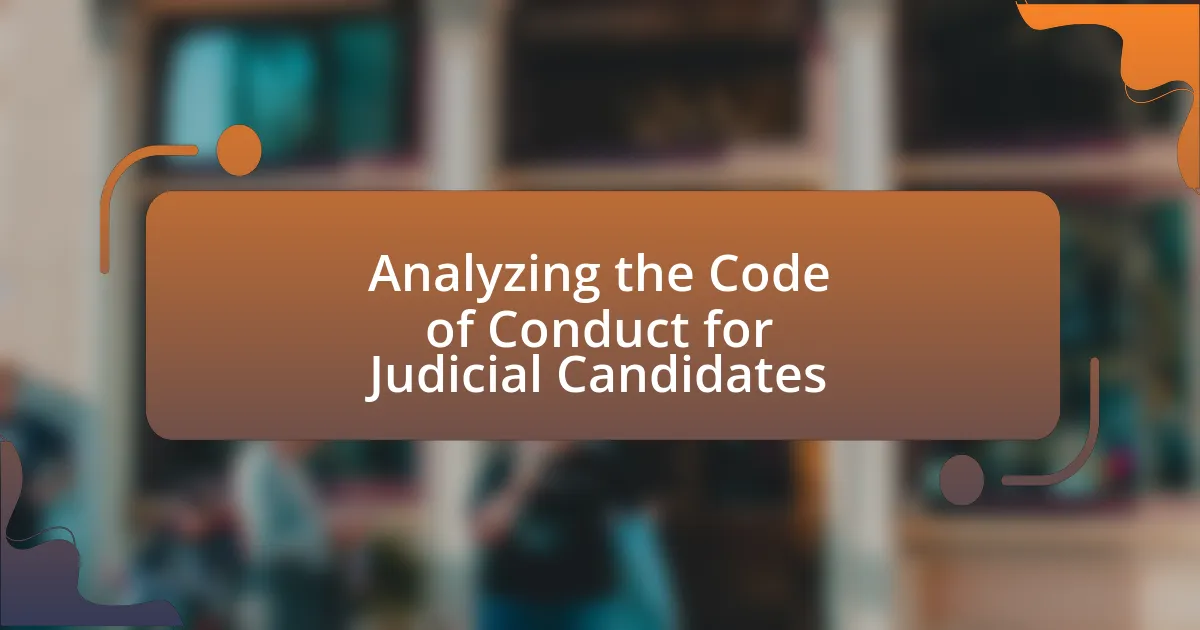The Code of Conduct for Judicial Candidates is a framework of ethical guidelines aimed at ensuring integrity, impartiality, and professionalism among candidates seeking judicial office. This article analyzes the significance of the Code, highlighting its role in promoting public confidence in the judiciary through established ethical standards, such as avoiding conflicts of interest and maintaining transparency in campaign conduct. It also discusses the principles underpinning the Code, the enforcement mechanisms in place, and the challenges candidates face in adhering to these guidelines. Additionally, the article addresses common misconceptions about the Code and its implications for candidates’ careers and the judiciary as a whole.

What is the Code of Conduct for Judicial Candidates?
The Code of Conduct for Judicial Candidates is a set of ethical guidelines designed to ensure that candidates for judicial office maintain integrity, impartiality, and professionalism during their campaigns. This code outlines specific standards regarding campaign conduct, including prohibitions against making misleading statements, engaging in partisan political activities, and allowing personal biases to influence judicial decisions. The American Bar Association (ABA) provides a model code that many states adopt or adapt, emphasizing the importance of public confidence in the judiciary and the necessity for candidates to uphold the dignity of the judicial office.
Why is the Code of Conduct important for judicial candidates?
The Code of Conduct is important for judicial candidates because it establishes ethical standards that promote integrity, impartiality, and public confidence in the judiciary. These standards guide candidates in their behavior and decision-making processes, ensuring they uphold the rule of law and maintain the dignity of the judicial office. For instance, adherence to the Code helps prevent conflicts of interest and promotes transparency, which are essential for maintaining public trust. Studies have shown that jurisdictions with clear ethical guidelines for judicial candidates experience higher levels of public confidence in the judicial system, reinforcing the necessity of the Code of Conduct.
What principles underpin the Code of Conduct for judicial candidates?
The principles that underpin the Code of Conduct for judicial candidates include integrity, impartiality, and respect for the rule of law. Integrity ensures that candidates maintain high ethical standards and avoid any conduct that could undermine public confidence in the judiciary. Impartiality requires candidates to remain neutral and fair, avoiding any appearance of bias or favoritism. Respect for the rule of law emphasizes the importance of upholding legal principles and ensuring that justice is administered fairly and consistently. These principles are essential for fostering public trust and maintaining the credibility of the judicial system.
How does the Code of Conduct promote public confidence in the judiciary?
The Code of Conduct promotes public confidence in the judiciary by establishing clear ethical standards that judges and judicial candidates are expected to follow. These standards ensure accountability, integrity, and impartiality, which are essential for maintaining trust in the judicial system. For instance, adherence to the Code helps prevent conflicts of interest and promotes transparency in judicial decision-making, thereby reinforcing the public’s belief that justice is administered fairly and without bias. Studies have shown that when judges adhere to ethical guidelines, public perception of the judiciary improves, as evidenced by increased surveys indicating trust in judicial processes.
What are the key components of the Code of Conduct?
The key components of the Code of Conduct for Judicial Candidates include adherence to ethical standards, maintaining impartiality, avoiding conflicts of interest, and ensuring transparency in campaign financing. These components are essential to uphold the integrity of the judiciary and promote public confidence in the legal system. Ethical standards guide candidates in their behavior and decision-making, while impartiality ensures that they remain unbiased in their judicial roles. Avoiding conflicts of interest protects the fairness of the judicial process, and transparency in campaign financing allows for accountability and public trust.
What ethical standards are outlined in the Code of Conduct?
The ethical standards outlined in the Code of Conduct for Judicial Candidates include integrity, impartiality, and respect for the law. These standards mandate that judicial candidates must conduct themselves in a manner that upholds the dignity of the judiciary, avoid any appearance of impropriety, and ensure that their actions do not undermine public confidence in the judicial system. For instance, candidates are required to refrain from making statements that could be perceived as prejudicial to the fairness of the judicial process, thereby reinforcing the principle of impartiality.
How do the rules regarding campaign conduct shape judicial candidates’ behavior?
Rules regarding campaign conduct significantly shape judicial candidates’ behavior by establishing ethical standards and guidelines that govern their actions during elections. These rules, often outlined in codes of conduct, require candidates to maintain impartiality, avoid partisan activities, and refrain from making promises that could compromise their judicial independence. For instance, the American Bar Association’s Model Code of Judicial Conduct emphasizes the importance of candidates conducting themselves in a manner that promotes public confidence in the integrity of the judiciary. This framework influences candidates to adopt a more restrained and professional approach, focusing on qualifications and judicial philosophy rather than engaging in aggressive campaigning or political maneuvering. Consequently, adherence to these rules fosters a judicial environment where candidates prioritize their role as impartial arbiters of the law over political ambitions.
How is the Code of Conduct enforced?
The Code of Conduct for Judicial Candidates is enforced through a combination of monitoring, investigation, and disciplinary actions by relevant judicial oversight bodies. These bodies, such as state judicial commissions or ethics boards, are responsible for reviewing complaints against candidates and determining if violations have occurred. For instance, the American Bar Association provides guidelines that many states adopt, which outline procedures for handling breaches of the Code. Enforcement mechanisms may include formal reprimands, suspension from candidacy, or other sanctions depending on the severity of the violation.
What mechanisms are in place for reporting violations of the Code?
The mechanisms in place for reporting violations of the Code include formal complaint procedures established by judicial oversight bodies. These procedures typically allow individuals to submit written complaints detailing the alleged violations, which are then reviewed by designated ethics committees or boards responsible for investigating such claims. For instance, many jurisdictions have specific guidelines that outline the process for filing complaints, including the necessary documentation and timelines for submission, ensuring that reports are handled systematically and transparently.
How do disciplinary actions impact judicial candidates?
Disciplinary actions significantly impact judicial candidates by affecting their credibility and public perception. When a judicial candidate faces disciplinary measures, such as reprimands or sanctions, it can lead to diminished trust from the electorate and legal community, ultimately influencing their chances of election or appointment. For instance, a study by the American Bar Association found that candidates with prior disciplinary actions are less likely to be viewed favorably by voters, as public confidence in their ability to uphold the law is compromised. This correlation underscores the importance of maintaining a clean professional record for judicial candidates to ensure their viability in the competitive landscape of judicial elections.

What challenges do judicial candidates face regarding the Code of Conduct?
Judicial candidates face significant challenges regarding the Code of Conduct, primarily due to the stringent ethical standards and expectations that govern their behavior. These candidates must navigate complex rules that restrict their ability to engage in political activities, express personal opinions, or participate in fundraising, which can limit their visibility and support during campaigns. Additionally, the ambiguity in certain provisions of the Code can lead to confusion about permissible conduct, making it difficult for candidates to ensure compliance. For instance, the American Bar Association’s Model Code of Judicial Conduct outlines specific prohibitions, yet interpretations can vary, leading to potential missteps that could jeopardize a candidate’s campaign or future judicial career.
How do political pressures affect adherence to the Code of Conduct?
Political pressures can significantly undermine adherence to the Code of Conduct for judicial candidates by creating conflicts between personal beliefs and external expectations. For instance, candidates may feel compelled to align their public statements and actions with the interests of political parties or influential donors, which can lead to ethical compromises. Research indicates that judges facing political scrutiny often modify their behavior to avoid backlash, thereby compromising their impartiality and integrity. This dynamic is evident in various jurisdictions where judicial elections are influenced by campaign contributions, leading to a perception of bias and a potential erosion of public trust in the judiciary.
What role does public opinion play in judicial candidates’ compliance?
Public opinion significantly influences judicial candidates’ compliance with ethical standards and codes of conduct. Candidates often align their behavior and campaign strategies with prevailing public sentiments to secure voter support and maintain legitimacy. Research indicates that candidates who are perceived as responsive to public concerns are more likely to gain trust and favorable evaluations from the electorate. For instance, a study by the American Judicature Society found that public perception of judicial integrity directly correlates with candidates’ adherence to ethical guidelines, highlighting the importance of public opinion in shaping compliance behaviors among judicial candidates.
How can judicial candidates navigate conflicts between personal beliefs and the Code?
Judicial candidates can navigate conflicts between personal beliefs and the Code by adhering strictly to the ethical guidelines outlined in the Code of Conduct while maintaining transparency about their beliefs. The Code emphasizes impartiality, integrity, and the importance of upholding the law above personal convictions. For instance, candidates should engage in self-reflection to identify potential biases and seek training or mentorship to better understand how to separate personal views from judicial responsibilities. This approach is supported by the American Bar Association’s Model Code of Judicial Conduct, which highlights the necessity for judges to avoid any appearance of bias or impropriety, ensuring that personal beliefs do not interfere with their duty to administer justice fairly.
What are common misconceptions about the Code of Conduct?
Common misconceptions about the Code of Conduct include the belief that it is optional for judicial candidates, when in fact it is mandatory and serves as a binding framework for ethical behavior. Another misconception is that the Code only applies during election periods; however, it governs conduct at all times, ensuring integrity and impartiality in the judiciary. Additionally, some individuals mistakenly think that the Code is solely about prohibiting misconduct, while it also emphasizes the promotion of public confidence in the judicial system. These misconceptions can lead to misunderstandings about the responsibilities and ethical obligations of judicial candidates.
How do misunderstandings about the Code affect judicial campaigns?
Misunderstandings about the Code of Conduct for Judicial Candidates can significantly undermine judicial campaigns by creating confusion regarding ethical standards and expectations. When candidates misinterpret the Code, they may inadvertently engage in conduct that violates its provisions, leading to potential disqualification or damage to their reputations. For instance, a candidate might misjudge the permissibility of campaign contributions, resulting in accusations of impropriety that can derail their campaign. Furthermore, public misperceptions about the Code can influence voter opinions, as constituents may question a candidate’s integrity based on incorrect assumptions about their adherence to ethical guidelines. This dynamic can ultimately skew the electoral process, as candidates who are unfairly judged may lose support despite their qualifications.
What myths exist regarding the enforcement of the Code?
Myths regarding the enforcement of the Code of Conduct for Judicial Candidates include the belief that violations are rarely addressed and that enforcement is inconsistent. In reality, the enforcement mechanisms are established to ensure accountability, and violations can lead to disciplinary actions, including censure or disqualification. For instance, the American Bar Association outlines procedures for reporting and investigating breaches, demonstrating that enforcement is both systematic and serious.

How can judicial candidates effectively adhere to the Code of Conduct?
Judicial candidates can effectively adhere to the Code of Conduct by thoroughly understanding its provisions and consistently applying them in their campaign activities. This involves engaging in training programs that focus on ethical standards, seeking guidance from experienced legal professionals, and regularly reviewing the Code to ensure compliance with its principles. Research indicates that candidates who participate in ethics training are more likely to recognize and avoid potential conflicts of interest, thereby enhancing their adherence to the Code.
What best practices should judicial candidates follow?
Judicial candidates should adhere to best practices that include maintaining impartiality, transparency, and ethical conduct throughout their campaigns. Impartiality ensures that candidates do not show favoritism or bias, which is crucial for public trust in the judiciary. Transparency involves disclosing campaign contributions and affiliations, allowing voters to make informed decisions. Ethical conduct encompasses following the rules set forth by judicial conduct codes, such as avoiding conflicts of interest and refraining from making promises about future rulings. These practices are supported by various judicial conduct codes, such as the American Bar Association’s Model Code of Judicial Conduct, which emphasizes the importance of integrity and public confidence in the judicial system.
How can candidates ensure transparency in their campaigns?
Candidates can ensure transparency in their campaigns by publicly disclosing their funding sources and expenditures. This practice allows voters to understand who supports the candidates financially, which can influence their decisions. For instance, the Federal Election Commission mandates that candidates report contributions and spending, providing a framework for accountability. Additionally, candidates can engage in open forums and debates, allowing for direct interaction with voters and fostering an environment of openness. By adhering to these practices, candidates not only comply with legal requirements but also build trust with the electorate.
What strategies can candidates use to engage with the community while adhering to the Code?
Candidates can engage with the community while adhering to the Code by participating in public forums, hosting informational sessions, and collaborating with local organizations. These strategies allow candidates to share their judicial philosophies and listen to community concerns without making promises or commitments that could violate ethical guidelines. For instance, public forums enable candidates to discuss legal issues and community needs, fostering transparency and trust. Additionally, hosting informational sessions can educate the public about the judicial process, ensuring that candidates remain informative rather than promotional. Collaborating with local organizations can also provide candidates with insights into community issues while maintaining a neutral stance, thus aligning with the ethical standards set forth in the Code of Conduct for Judicial Candidates.
What resources are available for judicial candidates regarding the Code of Conduct?
Judicial candidates have access to various resources regarding the Code of Conduct, including official guidelines published by judicial organizations, training programs, and legal advisory services. The American Bar Association provides a Model Code of Judicial Conduct, which serves as a foundational resource for understanding ethical obligations. Additionally, state judicial conduct commissions often offer specific resources tailored to local rules and interpretations. These resources are designed to help candidates navigate ethical considerations and ensure compliance with established standards.
Where can candidates find training on ethical campaigning?
Candidates can find training on ethical campaigning through organizations such as the National Association of Secretaries of State (NASS) and the American Bar Association (ABA). These organizations offer resources, workshops, and seminars focused on ethical practices in campaigning, specifically tailored for judicial candidates. For instance, the ABA provides guidelines and training materials that align with the Code of Conduct for Judicial Candidates, ensuring candidates are well-informed about ethical standards and practices.
What organizations provide support for judicial candidates navigating the Code?
Organizations that provide support for judicial candidates navigating the Code include the American Bar Association (ABA), which offers resources and guidance on ethical standards, and the National Association of Women Judges (NAWJ), which focuses on promoting diversity and providing mentorship. Additionally, the National Judicial College (NJC) provides educational programs that help candidates understand the Code of Conduct. These organizations are recognized for their commitment to enhancing the integrity and professionalism of judicial candidates through comprehensive support and resources.
What are the implications of non-compliance with the Code of Conduct?
Non-compliance with the Code of Conduct for Judicial Candidates can lead to disciplinary actions, including censure, suspension, or disqualification from judicial office. Such implications arise because adherence to the Code is essential for maintaining public trust and the integrity of the judicial system. For instance, the American Bar Association emphasizes that violations can undermine the fairness of judicial proceedings and erode confidence in the judiciary, which is critical for its effective functioning.
How can violations affect a candidate’s career and reputation?
Violations can severely damage a candidate’s career and reputation by leading to disqualification from the election process and loss of public trust. For instance, candidates found guilty of ethical breaches may face sanctions from judicial oversight bodies, which can include removal from the ballot or disbarment. This not only hampers their immediate electoral prospects but also tarnishes their long-term professional credibility. Research indicates that public perception of integrity is crucial in judicial elections; candidates with a history of violations often experience a significant decline in voter support, as evidenced by studies showing that 70% of voters prioritize ethical conduct when selecting judicial candidates.
What are the long-term consequences for the judiciary as a whole?
The long-term consequences for the judiciary as a whole include diminished public trust and increased scrutiny of judicial conduct. Over time, if judicial candidates fail to adhere to ethical standards outlined in the Code of Conduct, it can lead to a perception of bias or corruption within the judiciary. This erosion of trust can result in lower public confidence in judicial decisions, as evidenced by surveys indicating that public perception of judicial integrity is crucial for the legitimacy of the legal system. Furthermore, increased scrutiny may lead to more stringent regulations and oversight, impacting the autonomy of the judiciary and potentially hindering its effectiveness in upholding the law.
